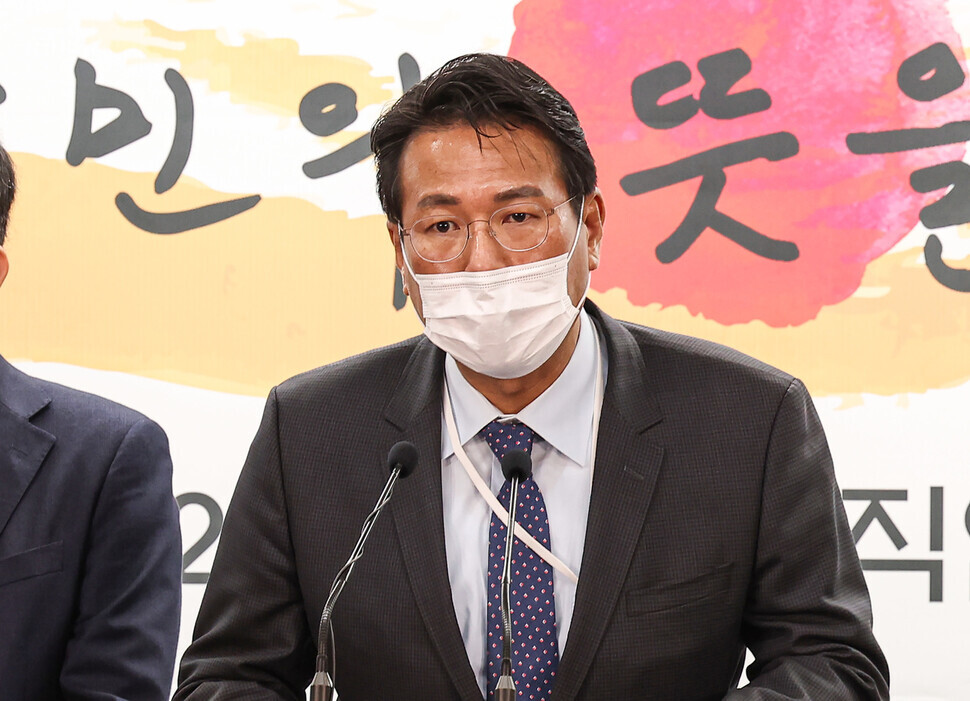hankyoreh
Links to other country sites 다른 나라 사이트 링크
Yoon seeks to upgrade S. Korea-US alliance, pursue reciprocity with N. Korea

The transition committee for President-elect Yoon Suk-yeol named South Korea becoming a “global linchpin state contributing to freedom, peace, and prosperity” as its target for the area of foreign affairs and national security in its list of 110 policy initiatives announced Tuesday.
In addition to a stronger emphasis on the South Korea-US alliance, the committee also stressed the importance of “reciprocity” with North Korea. The additional deployment of Terminal High Altitude Area Defense (THAAD) batteries, which had been a matter of some controversy, was not included on the list.
In terms of North Korea policy, the transition committee said it planned to “achieve sustainable peace on the Korean Peninsula through North Korea’s complete and verifiable denuclearization.” It also said it intended to pursue “denuclearization based on principles and consistency” and the “establishment of a peace regime.”
It further announced plans to “present a road map for foreseeable denuclearization based on close coordination with the US, while pursuing denuclearization negotiations with North Korea based on the principle of reciprocity.”
Kim Tae-hyo, a transition committee member who was nominated as first deputy director of the National Security Office, said, “Even if we aren’t repeating the typical ‘CVID’ [complete, verifiable, and irreversible denuclearization] phrases, they still apply.”
In terms of a timeline for pursuing economic and development cooperation with North Korea, the committee said this would happen when “progress is made with North Korea’s denuclearization.”
Under this approach, South Korea would use economic cooperation with the North to hasten its denuclearization — a similar concept to the Lee Myung-bak administration’s “Vision 3000: Denuclearization and Openness” approach to North Korea policy, which failed to yield results.
With the listing of “normalizing inter-Korean relations” as one of its government tasks, the Yoon administration signaled a strong sense of concern about the current state of relations with Pyongyang.
Commenting on the omission of additional THAAD deployments from the list of tasks, Kim Tae-hyo said, “You can view it as us continuing with our current circumspect approach.” He also said the matter would be “reviewed as we continue to view the security situation going forward.”
Additionally, the transition committee announced plans to expand the relationship with the US into a “comprehensive strategic alliance,” while establishing a “future partnership” with Japan that aligns with shared interests and values based on a return to shuttle diplomacy and restoration of trust.
It did not announce any plans for concrete solutions to address issues in South Korea-Japan relations such as compensation for survivors of forced labor mobilization and military sexual slavery and the controls imposed by Tokyo on certain exports.
By Kwon Hyuk-chul, staff reporter
Please direct questions or comments to [english@hani.co.kr]

Editorial・opinion
![[Column] Season 2 of special prosecutor probe may be coming to Korea soon [Column] Season 2 of special prosecutor probe may be coming to Korea soon](https://flexible.img.hani.co.kr/flexible/normal/500/300/imgdb/original/2024/0426/3317141030699447.jpg) [Column] Season 2 of special prosecutor probe may be coming to Korea soon
[Column] Season 2 of special prosecutor probe may be coming to Korea soon![[Column] Park Geun-hye déjà vu in Yoon Suk-yeol [Column] Park Geun-hye déjà vu in Yoon Suk-yeol](https://flexible.img.hani.co.kr/flexible/normal/500/300/imgdb/original/2024/0424/651713945113788.jpg) [Column] Park Geun-hye déjà vu in Yoon Suk-yeol
[Column] Park Geun-hye déjà vu in Yoon Suk-yeol- [Editorial] New weight of N. Korea’s nuclear threats makes dialogue all the more urgent
- [Guest essay] The real reason Korea’s new right wants to dub Rhee a founding father
- [Column] ‘Choson’: Is it time we start referring to N. Korea in its own terms?
- [Editorial] Japan’s rewriting of history with Korea has gone too far
- [Column] The president’s questionable capacity for dialogue
- [Column] Are chaebol firms just pizza pies for families to divvy up as they please?
- [Column] Has Korea, too, crossed the Rubicon on China?
- [Correspondent’s column] In Japan’s alliance with US, echoes of its past alliances with UK
Most viewed articles
- 1AI is catching up with humans at a ‘shocking’ rate
- 2‘We must say no’: Seoul defense chief on Korean, USFK involvement in hypothetical Taiwan crisis
- 3[Column] Season 2 of special prosecutor probe may be coming to Korea soon
- 4Korea sees more deaths than births for 52nd consecutive month in February
- 5Is N. Korea threatening to test nukes in response to possible new US-led sanctions body?
- 6Is Japan about to snatch control of Line messenger from Korea’s Naver?
- 7[Guest essay] The real reason Korea’s new right wants to dub Rhee a founding father
- 8[Editorial] Korea’s surprise Q1 growth requires objective assessment, not blind fanfare
- 9Division commander ordered troops to enter raging flood waters before Marine died, survivor says
- 10Park administration’s distorted history textbooks made public